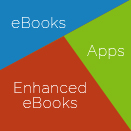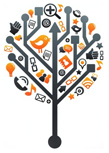How to choose the right digital content medium for your business? Should you go for an eBook, enhanced eBook, or app? Which one best suits your purpose and more answers that you must have before you begin looking into eBook creation and conversion services.


Digital storytelling is one of the most disruptive educational innovations that has successfully engaged students in deep and meaningful learning. At present, digital content is available in three major formats – eBooks, enhanced eBooks, and mobile apps.
Therein lies the dilemma for digital content creators and educators.
- How do they differ?
- How to pick one for the best impact?
eBooks, enhanced books, and apps- while similar in their core functionalities- have different capabilities, features, price differentiators, target use cases, etc. They serve one purpose, albeit in diverse ways and through a wide range of flexibilities. The trick to solving the eBook vs. Enhanced eBook vs. app conundrum lies in understanding the overlaps and blurs in their definitions.
Here’s a quick look into the top differences between eBook and enhanced eBooks and mobile apps to help you find out why the distinction matters in today’s times?
Production Process of eBooks, Enhanced eBooks, and Apps
eBooks are easier to create, but their capabilities are limited when compared to other formats. While eBooks can be developed by a person not having any formal education in software development, apps on the other hand require experienced and highly skilled software programmers and developers. Enhanced eBooks are not as complex to create as apps. However, experience and technical skill sets are still necessary. Enhanced eBooks and apps most often need multimedia content, like animation, audio, video, etc., which require a high level of talent and expertise to produce.
Selling Potential of eBooks, Enhanced eBooks, and Apps
Even though apps are highly interactive and offer a range of possibilities, they are often sold at a lesser price in the marketplace. This is because eBooks are actually converted books and people are used to paying a certain amount for literary work. Whereas apps are available over the internet and people are under a habit of downloading apps for free.
We can find many applications over the internet that are initially available for free. The free apps usually feature the entire story. However, only limited multimedia features are enabled. To have access to all the available features, a certain amount has to be paid, which is often low since the customers are accustomed to paying less for such apps.
When it comes to eBooks and enhanced eBooks, users can generally download a preview version to get a glimpse of what the eBook is all about. Customers often compare the cost of buying a hardcover book with that of purchasing a digital book or eBook. This is the reason why the buyer’s expectations with respect to price are not too high in the case of eBooks and this makes it easier for eBook sellers to charge more from customers.
eBooks, Enhanced eBooks and Apps Compatibility with Devices
Each format caters to a different audience base.
Apps provide greater interaction and personalization options to users, whereas an enhanced eBook provides more scope for the addition of multimedia content such as audio, video, etc. All of these are being increasingly made compatible with new-age smartphones, tablets, and other mobile devices to make learning content easily accessible to the learners.
To put it simply, while a basic eBook may run on every browser out there (when converted into a PDF or ePUB format,) you may need assistance from an interactive eBook development services provider to get the exact compliance from an enhanced eBook. At the same time, if you choose to develop an Android-compatible eBook mobile app, you will lose the users on any Apple device and vice-versa. If you decide to build for both platforms, the cost of the affair increases. If instead, you go for a cross-compatible app, the price still rises, but the complexity does not.
I.e., in the present-day market situation of multiple devices, OS, platforms, and constant innovation, any digital content medium you choose will be a trade-off. Therefore, study your target audience very closely to make a compatible selection between eBooks, enhanced eBooks, or apps.
Which Type Of Digital Book Should You Create?
This is a spiraling decision. One second, you are booking at eBook creation and conversion services, and the next, you are comparing development costs for complexities that you may never need.
There are many choices nested in this arena and just as many opportunities to lose time and money. So, you need to be very clear-headed.
Know the top differences between eBook, enhanced eBooks, and mobile eBook apps. Get to know how much it costs to design them, what flexibilities each offers, and which one is more likely to help you realize your objectives.
Simply put, making a decision about which format to choose for creating your digital book will depend on a range of factors, such as:
| Parameters | eBooks | Enhanced eBooks | Mobile App |
|---|---|---|---|
| Features |
|
|
|
| Development Complexity | Easy to develop. As simple as running an MS Word file or PDF through EPUB. Does not require specific coding or programming knowledge. | Since they involve rich media and complex functions, developing them also relies on the acute understanding of designing those interactions. | Requires professional coding, testing, and development. Also involves prototyping and is better done with a team. |
| Development Cost (Ballpark) | $500 to $2000 – Depending on what your eBook is supposed to do and how much work needs to be done on it. (i.e., content, design, research, etc.)$0 to $50 -If you only need to turn a printed book into its digital copy while fixing all orientation issues. | $500 to $3000- Depending on how interactive you need it to be and who you hire to get the job done. (Single freelancer will cost more than an outsourced team at times.) | $5000-$10,000- Depending on the span of development, size of the app, eReading functions, other requirements, as well as the cost of the team you hire, this cost varies. |
| Ease of Distribution | Easy to distribute across the internet. | Is device-specific and hence, can create distribution issues. | The ease of distribution depends on the target platform. |
| Platform Compatibility | Nook, Apple iBookstore, Amazon, Kobo. | Apple iBookstore, Nook Store, Amazon Kindle Store, Kobo. | Google Play Store, Apple App Store, Amazon App Store for Android, Windows 8 Store, Barnes and Noble App store, etc. |
| Device Compatibility | Nook, Kindle, Kobo Reader, iPhone, etc. | Apple, Kobo, PocketBook, Kindle Fire | Android & iOS Smartphones and Tabs |
| Ease of Sharing & Discovery | Easily shareable via a link. | Easily shareable on the allocated devices. | Easy to share via downloadable link. |
| Market Price | Most eBooks (that aren’t offered for free) range between $2 to $5. | $40 to $100 -Depending on where you have hosted the books. | Price ranges from $3 to $5. Most of these apps provide a trial version with limited functionality which can be downloaded for free. |
Need More Assistance? We Got You!
If you still find yourself mulling over the top differences between eBook and enhanced eBooks and mobile apps, remember the golden rule.
Your content needs to create a “Wow, that’s so cool!” impact. But, once that initial impression is done, the interest must not fizzle out. So, you choose based on this understanding- that whatever the medium may be, it must support your content, encourage audiences to read, and keep their interests throughout while ensuring engagement on multiple levels.
If you have any more doubt regarding this subject, or have a specific query in mind about outsourcing interactive eBook development services, enhanced eBook conversion, or mobile app development, contact us for more information.
We will be happy to provide you with any assistance pertaining to ePublishing Solutions including creating Children’s eBooks, ePub for Education, Enhanced eBooks, Audiobooks & Mobile Apps, and distributing them across major distribution channels, like Amazon, Apple iBookstore, and Barnes & Noble.
FAQs
1. How can an eBook be an app?
Simple. It is a mobile application that contains one book, designed to facilitate reading and reader activities. It requires a front-end, a back-end, and some action programming.
2. Why should any business outsource eBook creation and conversion services?
Outsourcing is cheaper than hiring a freelance resource or an in-house team member. Outsourcing to a reputed vendor makes the process trustworthy and the results more favorable.
If you choose SunTec India for eBook conversion services, here are the benefits you are signing up for.
- 25+ years of industry experience
- Industry’s best turnaround time
- Access to experts in your field
- Latest infrastructure
- Quick delivery
- High data security
- Creative outcomes
- Complete control over code
- Up to 60% cost savings

